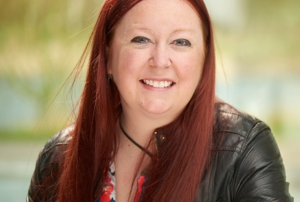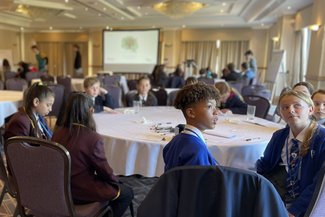Experts say sustainable education is essential for a more just and equitable society. While passion plays a part, we must also equip young people with the practical skills to help them practice social responsibility. A key challenge today is integrating this mindset throughout the education system. On 14 November, Edge and Schools of Tomorrow hosted the Sustainable Education Summit 2024 in Coventry. This lively conference gathered together school leaders, students and other key stakeholders to explore how we can advance the sustainable education agenda. Chaired by Azita Zohhadi (Schools of Tomorrow) and Olly Newton (Edge), the summit sparked robust discussions about how to drive positive change.
Shafat Khan (Community and Partnerships Manager, Ashoka) opened the conference with a deeply personal story about compassion. Following significant personal struggles and mental health challenges, he founded a fair-trade clothing organisation in 2017 aimed at supporting women in rural Indian villages. This initiative resulted in a positive shift in women's employment within those communities. But it also helped Shafat personally – by finding his purpose, he overcame personal challenges and now works with Ashoka to drive change globally. "Finding compassion renewed my sense of purpose, decreased my anxieties, and helped me find a connection that shaped my identity" he said. The key is finding our purpose through compassion for ourselves and others.

Next, Dr Bethan Garrett from Lancaster University offered some practical lessons on building social value through the Morecambe Bay Curriculum) (MBC). The MBC aims to foster community in local education by nurturing a sense of purpose and a passion for working with one another and the environment. While the curriculum itself is admirable, her insights underscored that sustainable education cannot stand alone - it must cultivate connections between learners and their communities. Reflecting on the event, Dr Garrett said: “The Summit was a great opportunity to share our curriculum co-design work and inspire others to form similar collaborative partnerships. We are committed to the ‘Head, Heart, Hands’ philosophy, whereby pupils can develop knowledge, problem-solving skills and compassion for the natural world.”

Lucy Supperstone (Director of Innovation and Standards at the Leadership Skills Foundation) and Jon Turner (Head of Education at WWF), outlined the Environment Leaders Programme (ELP). Developed with WWF and RSPB, the ELP provides structured learning resources while fostering confidence and mental well-being.
- Level 2 targets students aged 11+, focusing on leadership through purposeful activities within English schools.
- Level 3, aimed at ages 16-19 across England, Scotland, and Northern Ireland, allows students to earn UCAS points while gaining practical experience in planning projects for positive environmental change.
Lucy reflected on its importance: “Education providers have an opportunity to empower young people to become changemakers…Essential leadership skills development prepares young people to have impact on their community through environment based social action. It is clear that our pupils are ready to take the lead in making positive changes in their school and college communities.” SEND students from Grange Academy and Goldington Green Academy also shared their perspectives on social justice. Despite a few nerves, they demonstrated remarkable courage in presenting to a room of over 100 delegates.
The summit also encouraged active participation. In the morning, students took part in workshops focused on the event’s themes of compassion, leadership, power, and justice and then presented their work in the afternoon. The emotional connections forged during these discussions were clear. One young person, for example, questioned our reliance on cars and urged us to consider more sustainable options. Another spoke with confidence and clarity about our power to instigate global change, which she said can be addressed through individual action. The young people brought fresh perspectives that adults in the room might not have considered. The main lesson was the importance of discovering and applying our sense of purpose as a motivational driver. Well-designed interventions are part of the puzzle, but only by aligning these with personal passions can we inspire action.

We learned that while sustainability means environmental stewardship, it also implies educational initiatives that endure. This dual aspect of sustainability is challenging to achieve. However, delegates left the summit with renewed optimism that transformation is possible and a few actionable strategies to integrate into their educational practice. We look forward to seeing what the next year brings!
